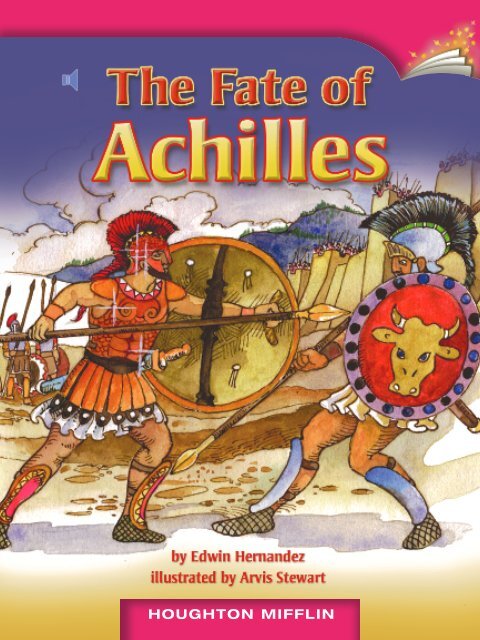You also want an ePaper? Increase the reach of your titles
YUMPU automatically turns print PDFs into web optimized ePapers that Google loves.
HOUGHTON MIFFLIN
y Edwin Hernandez<br />
Illustrated by Arvis Stewart<br />
ILLUSTRATION CREDITS: 5 Joe LeMonnier / Melissa Turk<br />
PHOTOGRAPHY CREDIT: Bkgrnd 2, 5, 11, 17 © Bob Ainsworth<br />
Copyright © by Houghton Mifflin Harcourt Publishing Company<br />
All rights reserved. No part <strong>of</strong> this work may be reproduced or transmitted in any form or by any means, electronic or<br />
mechanical, including photocopying or recording, or by any information storage and retrieval system, without the prior<br />
written permission <strong>of</strong> the copyright owner unless such copying is expressly permitted by federal copyright law. Requests<br />
for permission to make copies <strong>of</strong> any part <strong>of</strong> the work should be addressed to Houghton Mifflin Harcourt School Publishers,<br />
Attn: Permissions, 6277 Sea Harbor Drive, Orlando, Florida 32887-6777.<br />
Printed in China<br />
ISBN-13: 978-0-547-025<strong>18</strong>-6<br />
ISBN-10: 0-547-025<strong>18</strong>-1<br />
1 2 3 4 5 6 7 8 0940 <strong>18</strong> 17 16 15 14 13 12 11<br />
If you have received these materials as examination copies free <strong>of</strong> charge, Houghton Mifflin Harcourt School Publishers<br />
retains title to the materials and they may not be resold. Resale <strong>of</strong> examination copies is strictly prohibited.<br />
Possession <strong>of</strong> this publication in print format does not entitle users to convert this publication, or any portion <strong>of</strong> it, into<br />
electronic format.
Long ago, ancient Greeks told stories <strong>of</strong><br />
gods and goddesses who were forever<br />
meddling in the lives <strong>of</strong> mortals. One<br />
such myth is <strong>The</strong> Iliad, a tale <strong>of</strong> love,<br />
friendship, death, and glory. <strong>The</strong> Iliad<br />
remains one <strong>of</strong> the most famous Greek<br />
myths retold today. In it, the epic poet<br />
Homer describes the events <strong>of</strong> the Trojan<br />
War. This war lasted for ten years. A<br />
warrior named <strong>Achilles</strong> (uh KIL eez)<br />
played a key role in its outcome.<br />
2
<strong>The</strong> Prophecy <strong>of</strong> <strong>Achilles</strong><br />
When <strong>Achilles</strong> was born, his mother, a sea nymph, was<br />
told <strong>of</strong> a prophecy. <strong>The</strong> prophecy said that <strong>Achilles</strong> would be<br />
able to choose his own fate, or destiny. He could choose to live<br />
a long life and die an old man, surrounded by his family. If he<br />
chose this fate, however, he would live without achieving fame.<br />
Or, <strong>Achilles</strong> could win great glory on the battlefield. His name<br />
would go down in history as one <strong>of</strong> the greatest warriors ever to<br />
have lived. But if he chose this fate, he would die young.<br />
When <strong>Achilles</strong>’ mother heard this prophecy, she feared<br />
for her son’s safety. She carried baby <strong>Achilles</strong> to the river<br />
Styx. <strong>The</strong> water <strong>of</strong> this river was said to have magical powers.<br />
Holding <strong>Achilles</strong> by the heel, she immersed her son in the<br />
river’s waters. Now, he would be protected.<br />
3
<strong>The</strong> only place <strong>of</strong> weakness on his body was the heel by<br />
which she held him — because it had remained dry. She hoped<br />
that there would not be war. But war did come. One rash act by<br />
a handsome young prince set the wheels <strong>of</strong> fate in motion. <strong>The</strong><br />
story begins with a woman named Helen.<br />
Helen’s Suitors Swear an Oath<br />
Helen was a woman <strong>of</strong> exceptional beauty. She was<br />
the daughter <strong>of</strong> Zeus, the most powerful ancient Greek god.<br />
<strong>The</strong> kings <strong>of</strong> Greece would do anything to win Helen’s hand in<br />
marriage. But before making his decision, Helen’s father asked<br />
that all the suitors swear an oath to protect Helen. <strong>The</strong> kings all<br />
agreed. Helen wed Menelaus (men uh LAY uhs), king <strong>of</strong> Sparta.<br />
Menelaus was a good, kind man. Helen soon grew to love him.<br />
In the kingdom <strong>of</strong> Troy, a handsome young man named<br />
Paris had heard <strong>of</strong> Helen’s beauty. He was the son <strong>of</strong> the<br />
king, but he was not in a position powerful enough to pursue<br />
Helen. However, Paris struck a deal with the Greek goddess<br />
Aphrodite (AF row dy tee). In this deal, Aphrodite promised to<br />
make Helen Paris’ wife. Paris sailed immediately for Sparta to<br />
collect his bride. When Helen saw Paris, Aphrodite put her in<br />
a trance. That night while her family lay sleeping, Paris stole<br />
Helen and set sail toward the walled city <strong>of</strong> Troy.<br />
4
Ancient Greece<br />
Menelaus Calls for Help<br />
<strong>The</strong> next day, Menelaus learned that Paris had kidnapped<br />
Helen. Overcome with fury, he reminded the Greek kings <strong>of</strong><br />
their oath. “You swore an oath to defend Helen’s honor. <strong>The</strong><br />
time has come to fulfill your promise,” he declared.<br />
True to their word, each king contributed a massive fleet<br />
<strong>of</strong> ships. Each ship carried soldiers, weapons, and supplies. <strong>The</strong><br />
warrior <strong>Achilles</strong> led the largest group <strong>of</strong> ships. He had not taken<br />
the oath to defend Helen, but <strong>Achilles</strong> loved to fight. In all, 1,000<br />
ships set sail for Troy. Menelaus made his brother, Agamemnon,<br />
commander-in-chief <strong>of</strong> this mighty armada. <strong>The</strong>ir mission was to<br />
take back Helen and destroy the city <strong>of</strong> Troy.<br />
5
<strong>The</strong> War Begins<br />
<strong>The</strong> king <strong>of</strong> Troy looked toward the sea and saw a<br />
labyrinth <strong>of</strong> warships sailing swiftly toward his city. <strong>The</strong> king’s<br />
oldest son, Hector, led the Trojan army. Brave and strong,<br />
Hector was the Trojan’s fiercest warrior.<br />
<strong>The</strong> two armies fought hard, but neither side could defeat<br />
the other. Year after year the fighting went on.<br />
In the tenth year <strong>of</strong> bloodshed, the Greeks attacked<br />
and plundered several smaller cities not far from Troy. <strong>The</strong>y<br />
returned to their ships with stolen gold, weapons, and captives.<br />
One <strong>of</strong> the captives was Chryseis (kry SEE ihs), the daughter <strong>of</strong><br />
a priest <strong>of</strong> Apollo. Another was the servant <strong>of</strong> a rich merchant.<br />
Her name was Briseis (bry SEE ihs). Many claimed she was<br />
nearly as beautiful as Helen <strong>of</strong> Troy.<br />
6
<strong>Achilles</strong> fell in love with Briseis immediately. He loved her<br />
as fiercely as he loved to fight. Agamemnon took the priest’s<br />
daughter Chryseis as his personal servant.<br />
One night, the father <strong>of</strong> Chryseis found his way to<br />
Agamemnon’s tent. Before he could be dragged away, the priest<br />
cried out, “Agamemnon, release my daughter! You have no right<br />
to keep her!” But Agamemnon was not moved by the old man’s<br />
plea. “Get him out <strong>of</strong> here,” he ordered.<br />
On his way home, the old priest prayed to the god Apollo.<br />
“I call upon you to punish Agamemnon for dishonoring me<br />
and holding my daughter Chryseis against her will.” Apollo<br />
heard the priest’s prayer and decided to grant it.<br />
A Quarrel Among the Greeks<br />
<strong>The</strong> next day, Apollo sent a terrible plague upon the<br />
Greeks. Illness swept through their camp leaving the soldiers<br />
too weak to fight. But their enemy, the Trojans, did not get<br />
sick. <strong>The</strong> war began to turn in Troy’s favor. <strong>Achilles</strong> feared<br />
defeat. Desperate, he called a council <strong>of</strong> the Greek warlords.<br />
In this meeting, the leaders debated what to do next. <strong>The</strong>n a<br />
blind prophet spoke up. Turning toward Agamemnon, he said,<br />
“You must return Chryseis to her father if you wish to end this<br />
plague.” <strong>Achilles</strong> and the others agreed.<br />
“Very well,” said Agamemnon. “I will let her go on one<br />
condition — that <strong>Achilles</strong> pays the same price. He must give up<br />
Briseis.” <strong>Achilles</strong> clasped his sword. “If you take her away from<br />
me, I’ll kill you myself!” <strong>Achilles</strong> threatened.<br />
7
<strong>The</strong> next day, Chryseis was sent home to her father on<br />
Agamemnon’s orders. <strong>The</strong>n Agamemnon sent three servants<br />
to <strong>Achilles</strong>’ tent to take Briseis. Seeing the fear on the servants’<br />
faces, <strong>Achilles</strong> allowed Briseis to be taken without a fight.<br />
“I don’t blame you. I blame your master,” he told them. After<br />
she was gone, <strong>Achilles</strong> wept.<br />
When Apollo saw that Chryseis had been returned to her<br />
father, he ended the plague. <strong>The</strong> Greek soldiers recovered their<br />
strength and once more ripped through the Trojans’ lines.<br />
But the Trojans had more to lose than the Greeks and so<br />
fought harder. To make matters worse, <strong>Achilles</strong> now<br />
refused to fight.<br />
<strong>The</strong> Pride <strong>of</strong> <strong>Achilles</strong><br />
During the years that the Trojan<br />
War was being fought, another prophecy<br />
about <strong>Achilles</strong> became known. It said that<br />
the Greeks would not defeat the Trojans<br />
without <strong>Achilles</strong>. Indeed, <strong>Achilles</strong> was the<br />
one Greek soldier who brought terror to<br />
the Trojan army. Even Hector<br />
feared <strong>Achilles</strong>.<br />
Because his mother was a sea<br />
nymph, <strong>Achilles</strong> was born with some<br />
godlike qualities. He was the<br />
strongest, the bravest, and the<br />
most handsome <strong>of</strong> all the Greeks.<br />
8
He was also the most proud. <strong>Achilles</strong> could not forget that<br />
Agamemnon took Briseis away from him. Agamemnon had<br />
treated him like a lesser man in public. <strong>Achilles</strong> would not<br />
quickly forgive that. And so, his pride wounded, <strong>Achilles</strong><br />
abandoned his Greek comrades and dropped out <strong>of</strong> the war.<br />
Sulking in his tent, <strong>Achilles</strong> called upon his mother. “Go to<br />
Mount Olympus,” he said to her. “Ask Zeus to make sure the<br />
Greeks keep losing the war. I want them to realize how much<br />
they need me. I want them to feel how much I have lost because<br />
<strong>of</strong> Agamemnon’s selfishness,” he added bitterly.<br />
9
Thanks to Zeus’ interference, the Greeks continued to<br />
suffer great losses. Hector’s Trojan army succeeded in pushing<br />
the Greeks back toward the harbor where their ships lay at<br />
anchor. To protect the ships, the Greeks hastily built a rampart,<br />
or barricade, around the harbor. But the Trojans threatened to<br />
break through and burn the ships.<br />
Agamemnon Sends a Message to <strong>Achilles</strong><br />
Agamemnon knew the Greeks needed <strong>Achilles</strong> in order to<br />
win the war. Agamemnon sent three chiefs to <strong>Achilles</strong>’ camp<br />
with a message. One <strong>of</strong> the chiefs was Odysseus (oh DIS ee uhs),<br />
king <strong>of</strong> Ithaca. Odysseus was a trusted friend <strong>of</strong> <strong>Achilles</strong>. “If<br />
you join us,” Odysseus said to a somber <strong>Achilles</strong>, “Agamemnon<br />
will reward you with horses, gold, and servants.” Seeing no<br />
response from <strong>Achilles</strong>, Odysseus added, “He will also return<br />
your precious Briseis to you.”<br />
<strong>Achilles</strong> listened to the commanders, but he stood steadfast<br />
in his decision. He said, “Tell Agamemnon I do not accept his<br />
bribes. Tell him if he wants me to fight, he should come here<br />
in person and <strong>of</strong>fer a sincere apology.” Odysseus and the other<br />
chiefs left <strong>Achilles</strong>’ tent.<br />
“<strong>The</strong> pride <strong>of</strong> <strong>Achilles</strong> may prove to be the Greeks’ downfall,”<br />
Odysseus said to Agamemnon upon their return.<br />
10
A Greek poet named Homer was the<br />
first to record the story <strong>of</strong> <strong>The</strong> Iliad. Homer<br />
also recorded a companion piece called<br />
<strong>The</strong> Odyssey. This epic poem tells the story<br />
<strong>of</strong> Odysseus after the Trojan War. For ten<br />
long years, Odysseus wandered from island<br />
to island before he finally reached his<br />
homeland <strong>of</strong> Ithaca.<br />
Patroclus Fights for <strong>Achilles</strong><br />
<strong>Achilles</strong>’ best friend, Patroclus (puh TROH klus), came to<br />
see him. <strong>The</strong>y had fought side by side in many wars. “<strong>The</strong> battle<br />
is not going well,” said Patroclus. “Agamemnon, Odysseus,<br />
and Ajax have been wounded. Hector’s men have breached the<br />
rampart and are setting fire to the ships. Since you refuse to<br />
fight, let me wear your armor and fight in your place.”<br />
Washed in the river Styx, <strong>Achilles</strong>’ armor would repel<br />
any blow. So <strong>Achilles</strong> agreed. “Push back the Trojans,” he said.<br />
“But don’t try to kill Hector. One day the two <strong>of</strong> us will do that<br />
together, and the glory will be ours.”<br />
11
Patroclus put on the armor. Thinking <strong>Achilles</strong> had finally<br />
emerged to fight, 10,000 men cheered when they saw Patroclus<br />
emerge from <strong>Achilles</strong>’ tent. He stepped inside <strong>Achilles</strong>’ chariot<br />
and raised his hand. <strong>The</strong> Greek army fell into formation and<br />
roared as one furious beast. Under the command <strong>of</strong> Patroclus,<br />
the Greeks waged a fierce counter-attack against the Trojans.<br />
By late afternoon, they had driven the Trojans back toward<br />
the wall surrounding the city <strong>of</strong> Troy. Patroclus led another<br />
charge. Waves <strong>of</strong> Trojans fell like stalks <strong>of</strong> wheat. <strong>The</strong> Greeks<br />
gloried in the slaughter and advanced. <strong>The</strong> enemy’s line had<br />
finally begun to unravel.<br />
12
As the sun touched the water’s edge, Patroclus spotted<br />
Hector, the Trojan commander. Forgetting his promise to<br />
<strong>Achilles</strong>, Patroclus pursued Hector. <strong>The</strong> two warriors lifted<br />
their spears and raced toward each other. <strong>The</strong>ir chariots stirred<br />
up a cloud <strong>of</strong> dust that surrounded them. A great clash rang out<br />
when they met in the middle <strong>of</strong> the battlefield. After the dust<br />
settled, Patroclus lay dead.<br />
<strong>Achilles</strong> Accepts His <strong>Fate</strong><br />
Later that night, <strong>Achilles</strong> was resting in his tent when<br />
a messenger came to him. “What is it” <strong>Achilles</strong> asked.<br />
“Patroclus is dead.” <strong>The</strong> blood drained from <strong>Achilles</strong>’ face.<br />
<strong>The</strong> messenger continued, “Hector slew him in battle.”<br />
“But . . . how” <strong>Achilles</strong> finally asked. “He was wearing<br />
my armor.”<br />
“Hector’s spear struck Patroclus on the hip where your<br />
armor didn’t cover him. He died instantly. <strong>The</strong>n Hector<br />
unfastened the armor and put it on himself.”<br />
Even the loss <strong>of</strong> Briseis had not brought <strong>Achilles</strong> so much<br />
sorrow. <strong>Achilles</strong> wept so deeply that his mother, from miles<br />
away, rushed to Troy to comfort him.<br />
“Only one thing will lift this grief,” <strong>Achilles</strong> said to his<br />
mother. “I will make Hector pay for what he has done.”<br />
<strong>Achilles</strong>’ mother tried to reason with him, “<strong>The</strong> gods have<br />
decreed that after Hector is dead, your death will follow. If you<br />
leave now and return home, you can still die an old man. <strong>The</strong><br />
choice is yours, my son.”<br />
13
Rage over the death <strong>of</strong> Patroclus burned inside <strong>of</strong> <strong>Achilles</strong>.<br />
“I will do what must be done,” <strong>Achilles</strong> answered.<br />
At dawn the next day, <strong>Achilles</strong> saw a flash <strong>of</strong> light in the<br />
sky. His mother appeared, holding a new suit <strong>of</strong> armor fashioned<br />
by the gods. <strong>The</strong> armor shone brightly in the sun, and<br />
brought joy to <strong>Achilles</strong>’ heart.<br />
<strong>Achilles</strong>’ mother spoke. “Before you put this on, I want<br />
you to listen to me. Thousands <strong>of</strong> Greek soldiers have fought<br />
and died while you sat here in your tent and sulked.” Knowing<br />
which fate her son had chosen, she continued, “Swallow your<br />
pride and embrace your fate on the battlefield. Fame and glory<br />
await you.” <strong>Achilles</strong> knew that she was right. He hugged his<br />
mother in a warm embrace. <strong>The</strong> time to fight had come.<br />
14
<strong>Achilles</strong> summoned a council <strong>of</strong> Greek kings. <strong>The</strong>re,<br />
<strong>Achilles</strong> forgave Agamemnon. “What is past is past,” he said.<br />
“It’s time to finish what we started ten long years ago.”<br />
<strong>Achilles</strong> put on his new armor and climbed aboard his<br />
chariot. He led the final charge against the Trojans. At the mere<br />
sight <strong>of</strong> <strong>Achilles</strong> in his gleaming armor, the Trojan army fled in<br />
terror. <strong>The</strong> king <strong>of</strong> Troy ordered the city gates to be opened, and<br />
the Trojan soldiers scrambled to safety inside its walls. When<br />
the gates closed, only one man stood brave enough to face<br />
<strong>Achilles</strong> — Hector.<br />
<strong>The</strong> people <strong>of</strong> Troy stood on top <strong>of</strong> the city walls to watch<br />
the two great warriors go head-to-head.<br />
15
Hector and <strong>Achilles</strong> faced one another. Each man was<br />
determined to win glory for himself and victory for his army.<br />
Greeks and Trojans alike watched as <strong>Achilles</strong> and Hector<br />
displayed magnificent strength and skill. Hector’s aim was<br />
true as he forcefully threw his spear at <strong>Achilles</strong>. <strong>The</strong> spear<br />
struck <strong>Achilles</strong>’ shield. <strong>The</strong> armor <strong>of</strong> the gods was strong.<br />
16
Although Hector was a fierce warrior, he was no match<br />
for <strong>Achilles</strong>. With a loud cry, <strong>Achilles</strong> let loose his spear. It went<br />
straight into the s<strong>of</strong>t spot near Hector’s collarbone, killing him.<br />
<strong>The</strong> <strong>Fate</strong> <strong>of</strong> <strong>Achilles</strong><br />
Upon Hector’s death, the tide <strong>of</strong> the war finally turned in<br />
the Greeks’ favor. Meanwhile, <strong>Achilles</strong> awaited the rest <strong>of</strong> his<br />
fate. He had earned his glory on the battlefield. He knew that<br />
his death would soon follow Hector’s.<br />
<strong>The</strong> Trojan soldiers armed themselves with bows and<br />
arrows. <strong>The</strong>y stood atop the city walls shooting arrows at the<br />
Greek soldiers below. Paris, the younger brother <strong>of</strong> Hector,<br />
aimed a poisoned arrow at <strong>Achilles</strong>. <strong>The</strong> god Apollo guided<br />
the arrow, and it struck <strong>Achilles</strong> in the heel — the only area <strong>of</strong><br />
weakness on his body.<br />
<strong>The</strong> term “<strong>Achilles</strong>’ heel” is commonly<br />
used today. It indicates an area <strong>of</strong> weakness<br />
in a person who is otherwise very strong.<br />
For example, suppose a student gets good<br />
grades in every subject but math. Math<br />
would be that person’s “<strong>Achilles</strong>’ heel.”<br />
17
Surprised, <strong>Achilles</strong> looked up to see who had shot him<br />
in such a cowardly fashion. Reaching down, he pulled the<br />
arrow out. Blood gushed from the wound. <strong>The</strong> mighty warrior<br />
<strong>Achilles</strong> stumbled, then fell to his death.<br />
<strong>The</strong> prophecy had come true. <strong>Achilles</strong> died in great glory<br />
on the battlefield. His part in the war allowed the Greek army<br />
to eventually defeat the Trojans. Helen returned to her rightful<br />
husband. <strong>Achilles</strong>’ name went down in history.<br />
Thousands <strong>of</strong> years later, his story is still being told.<br />
Despite having great strength, skill, and divine protection,<br />
<strong>Achilles</strong> had a weakness. Even he, a mighty warrior, could not<br />
escape his fate.<br />
<strong>18</strong>
Responding<br />
TARGET SKILL Story Structure What is<br />
the setting <strong>of</strong> <strong>The</strong> <strong>Fate</strong> <strong>of</strong> <strong>Achilles</strong> What major<br />
characters are involved What resolution is<br />
there to the story’s conflict Copy and complete<br />
the chart below.<br />
Characters: <br />
Setting: <br />
Conflict: <strong>Achilles</strong> could win glory and die<br />
young or live a long life without fame.<br />
Resolution: <br />
Write About It<br />
Text to Self Write a paragraph summarizing why<br />
the Greeks went to war against Troy. Remember<br />
to only include major characters and events in<br />
the summary.<br />
19
TARGET VOCABULARY<br />
abandon<br />
bitterly<br />
embrace<br />
fury<br />
labyrinth<br />
massive<br />
rash<br />
somber<br />
steadfast<br />
unravels<br />
TARGET SKILL Story Structure Examine details<br />
about characters, setting, and plot.<br />
TARGET STRATEGY Infer/Predict Use text clues<br />
to figure out what the author means or what might<br />
happen in the future.<br />
GENRE A myth is a story that tells what a group <strong>of</strong><br />
people believes about the world.<br />
Write About It<br />
In a famous quotation, Aung San Suu Kyi said,<br />
“Please use your freedom to promote ours.”<br />
What freedoms do you value most Why Write<br />
a letter to the editor <strong>of</strong> a Burmese newspaper<br />
explaining the freedoms you have and why they<br />
are important to you.<br />
20
Level: W<br />
DRA: 60<br />
Genre:<br />
Myth<br />
Strategy:<br />
Infer/Predict<br />
Skill:<br />
Story Structure<br />
Word Count: 1,891<br />
6.4.<strong>18</strong><br />
HOUGHTON MIFFLIN<br />
Online Leveled Books<br />
1032425

















